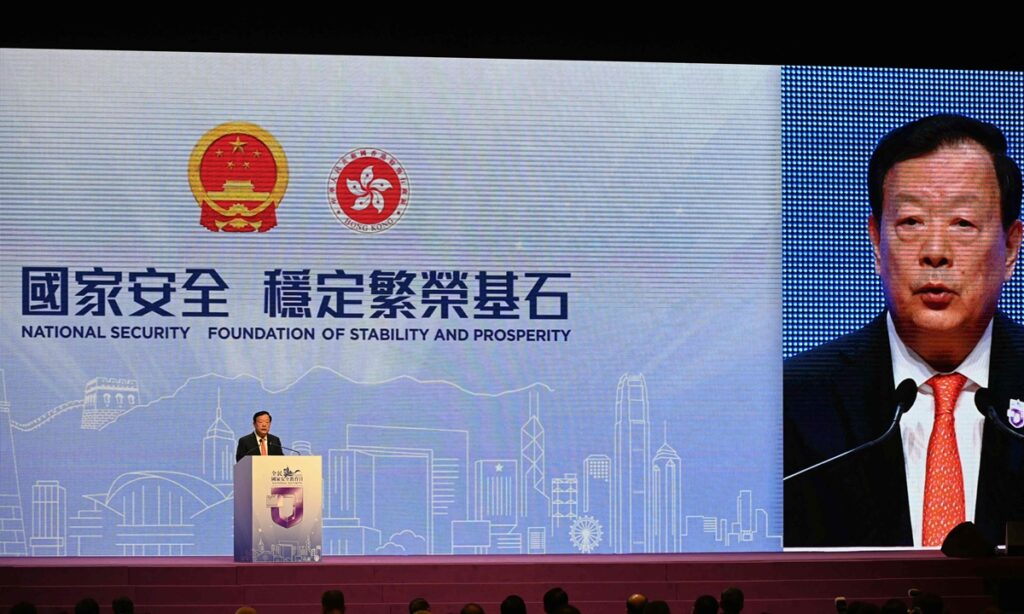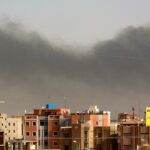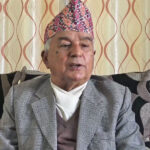Inspection tour highlights national security awareness, paving way for legislation of Article 23: experts
China’s top official on Hong Kong and Macao affairs Xia Baolong met with more than 80 lawmakers on Sunday during his inspection tour in the Hong Kong Special Administrative Region (HKSAR), which was described by some lawmakers as historical, signaling that the central government indeed cares about and pays close attention to the city’s development.
Although Xia did not mention the legislation of Article 23 during the meeting, his six-day tour shows that the central government plays the role of supervisor over Hong Kong affairs, and it also trusts in local justice and legal representatives to push forward Article 23 – the city’s constitutional responsibility in fixing loopholes in national security-related laws, some legal experts and policy advisors said.
Particularly, as both central and local officials in the HKSAR warned against national security risks and the possibility of a return of street violence on the occasion of the third National Security Education Day on Saturday, the completion of Article 23 is supported and expected by both the central and HKSAR governments.
Without the National Security Law (NSL) for Hong Kong and electoral reform with the principle of “only patriots administering Hong Kong,” there would be no such arrangement for central government officials to communicate with lawmakers, Andrew Leung, president of the Legislative Council (LegCo), told media following Xia’s visit, as the LegCo was a place witnessing the city’s darkest moment due to the extreme confrontations among different political groups.
“This was the first time that a central government official paid a visit to the LegCo and had such an exchange with lawmakers, which is a hard-won situation,” Nixie Lam, a lawmaker who attended the meeting, told the Global Times on Sunday.
In the past, some opposition lawmakers only focused on quarreling and using the filibuster and other malicious tactics to paralyze the legislature, and it was hard for lawmakers from different political groups to communicate and work together on bills related to people’s livelihoods and the economy, but now, it has changed and the legislature has become much more efficient in tackling social and economic issues, Lam said.
Some lawmakers who preferred not to be identified told the Global Times that the central government official addressed relations between the administration and the legislature, which should play positive roles for each other. Local media reported that Xia expected that Hong Kong society was in unity, and the development of democracy meant listening to different opinions.
Xia also reminded lawmakers that Western-style democracy has its own problems, and democracy does not necessarily mean “one cast, one vote.” They were also told “do not think that opposition is democracy,” which can be a form of consultation and find a good path for people, HK01.com said.
After the visit to the LegCo, Xia also met with representatives from the Law Society of Hong Kong and Hong Kong Bar Association on Sunday afternoon, the association’s chairman Victor Dawes was quoted as saying in local media reports. Dawes said that the central government’s message is very clear: It highly values the city’s rule of law, common law system and its judiciary sector.
During the inspection tour to Hong Kong, Xia reminded that national security risks still exist. Although the NSL for Hong Kong helped restore social order, the social turmoil in 2019 “is a permanent scar that cannot be erased,” Xia told the national security-themed activities on Saturday.
“It shows that the central government aims to increase the national security awareness among Hong Kong residents, paving the way for the legislation of Article 23,” Lau Siu-kai, a consultant from the Chinese Association of Hong Kong and Macao Studies, who is also a senior policy advisor, told the Global Times on Sunday.
As US-China relations become much more intense and the Taiwan Straits situation escalates, Hong Kong also faces bigger national security challenges in the future, Lau said, noting that when it comes to the legislation of Article 23, the central and HKSAR governments will work together to ensure a smooth process.
As early as 2003, it was close to realizing the legislation of Article 23 but it was severely disrupted and blocked by anti-government forces. The social turmoil in 2019 once again confirmed the importance of the national security-related legislation, legal experts said.
“I noticed that Xia mentioned his expectation for professional and responsible legal representatives to shoulder their responsibilities in safeguarding national security, which was encouraging,” Dr Louis Chen, a member of the Election Committee of Hong Kong and member of the all-China Youth Federation, told the Global Times on Sunday.
It’s also believed that with the atmosphere of national security education growing in Hong Kong, the legal sector will create all necessary conditions for finalizing Article 23 as soon as possible, Chen said.
(Global Times)




